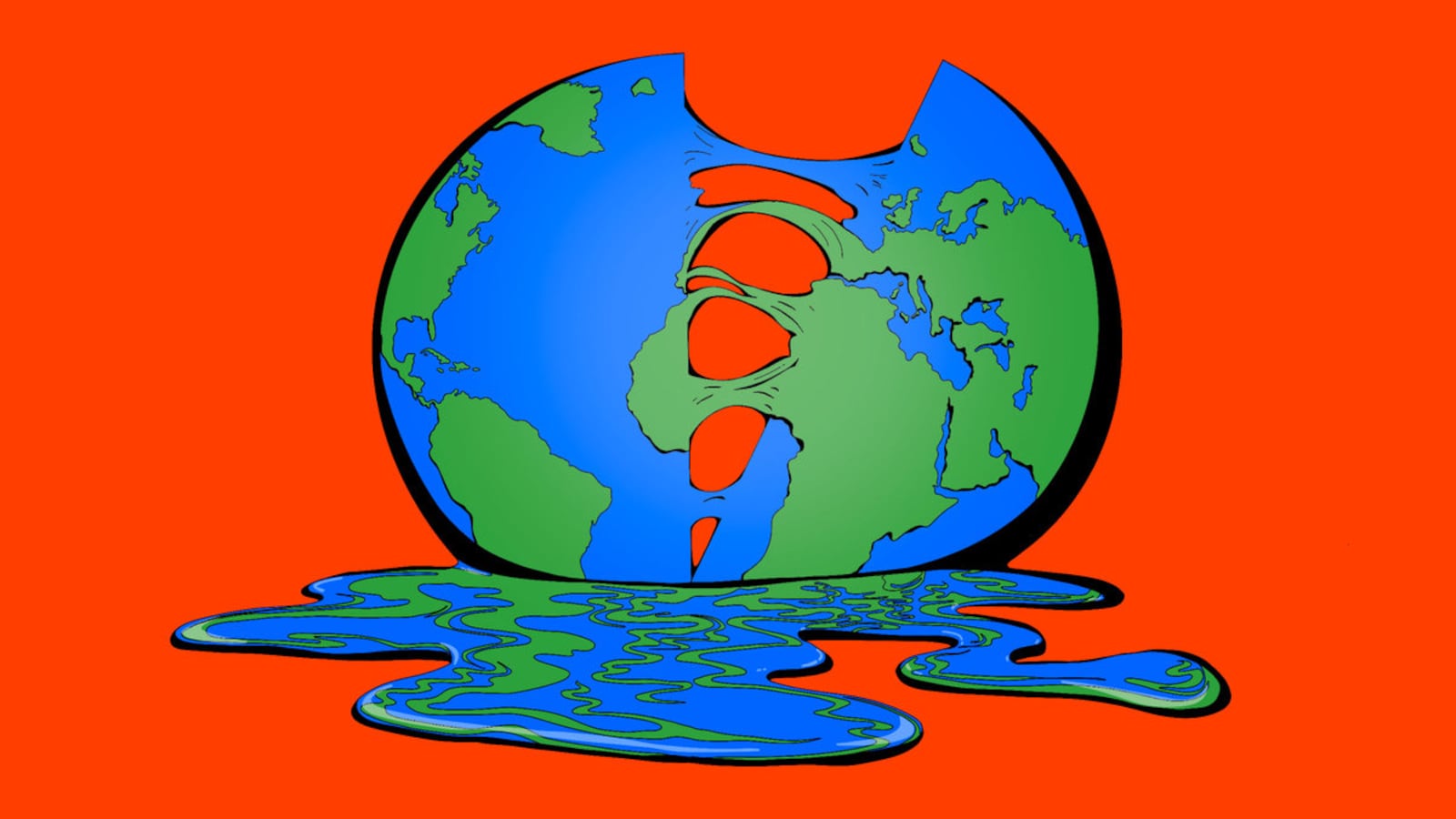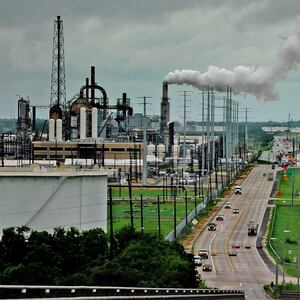The COP26 climate change conference held by the UN is finally at a close. World leaders and representatives descended on Glasgow for two weeks to hash out plans to save the planet from calamity, all in the midst of an ongoing public health crisis. The intersection of these two crises is remarkable—not least because how Americans have responded to the COVID-19 pandemic may be illustrative of how the country will react to an even greater threat. And for psychologists and other experts of human behavior, we should be terrified.
In a time of crisis, people tend to come together. It frequently happens after natural disasters like hurricanes and earthquakes, and during times of national strife like WWII and the months after 9/11. Regardless of their differences, people typically try to do what they can to help others when they’re facing dire circumstances.
The COVID-19 pandemic has not, however, been a time of national healing and unity in the U.S. Debates over lockdowns, mask mandates, and vaccination only exacerbated divisions. Polarized politics maimed the public health response to COVID. The pandemic brightened the spotlight on how tribal America has become.
“What’s so strange about what happened with COVID is the world handed Republicans and Democrats a common enemy—of the COVID virus—and everyone could have joined together to fight it,” Jon Krosnick, a social psychologist at Stanford University told The Daily Beast. “In fact, it went the opposite way.”
Psychologists like Krosnick have been stunned by this outcome. And they fear it is a stark warning for what may happen when climate change—one of the biggest existential threats humanity has ever faced—becomes a greater threat in our daily lives.
To better understand how psychologists have traditionally viewed human behavior in times of crisis, it may be helpful to take a look at something called the Robbers Cave experiment. In the summer of 1954, social psychologist Muzafer Sherif and his colleagues brought two groups of 11-year-old boys to a summer camp and had each group socialize and do activities in their own respective areas, with only members of their own group. They were called the Eagles and the Rattlers.
The researchers then brought these two teams together and had them compete for prizes through activities like football and hunting for treasure. A fierce rivalry soon developed between these teams—they even started burning each other’s team flags.
At this point, the researchers introduced a common threat: The water supply had been cut off, and they had to work together to solve that problem. That was just one of the outside threats they introduced. Sherif and his colleagues found that in the presence of something called a superordinate goal—a need that can only be addressed together, for the common good—the rivalry dissipated.
According to Krosnick, this is typically what you would expect from people. When there’s a common enemy, groups that are typically at odds will join forces to face it.

Some of the participants in the Robbers Cave experiment.
The British Psychological Society/University of AkronThat’s not what we’ve seen in this country during the COVID-19 pandemic. One study published in Science Advances in January found that “partisanship is a far more important determinant of an individual’s response to the COVID-19 pandemic than the impact of COVID-19 in that individual’s local community.” Regardless of what the public health guidelines and rules were where they lived, Democrats were more likely to stay home when infection rates in their community spiked; while Republicans were more likely to go out.
Krosnick was shocked the crisis wasn’t a unifying moment. He said it’s clear politics has brought us to a place where we can’t come together at times when one would expect that we would.
“It’s literally life or death. It couldn’t have been any more non-trivial than it has been. For partisanship to win out over that is an amazing thing,” Krosnick said. “It’s a testimony to how powerful partisanship is.”
Peter Coleman, a psychologist at Columbia University, told The Daily Beast that we may be learning that national crises are no longer sufficient to overcome polarization in America. He said the political climate has become very “reactionary and tribal.”
“I think we’re in an ‘us vs. them’ place, and I think it could get worse,” Coleman said.
The failure of Americans to come together during the pandemic doesn’t inspire hope that Americans will be able to unite to face an even bigger crisis: climate change. President Biden’s appearance at the UN’s climate change summit in Glasgow this month was hampered by the fact Congress can’t seem to come together to pass the Build Back Better bill to address the climate issue. Even more fundamentally, cultural divisions in America could greatly intensify if climate change gets bad enough that people are feeling desperate, angry and lacking basic resources.
“If it turns out that we start to run out of resources—if we start running out of food, if we start running out of places to live, if the price of air conditioning goes way up so poor people are getting cooked at home—that kind of stuff very much has the potential to create social conflict,” Krosnick said.
Between the constant wildfires out West, a battery of hurricanes hitting the South every year, and temperatures increasing annually, there are concerns that civil society could burst at the seams if things continue to get worse and resources start to become much more scarce.
Humans aren’t particularly good at responding to those kinds of conditions, Coleman added. When we don’t feel like our basic needs are covered and we’re facing great uncertainty, we don’t tend to behave logically.
“I think it puts us on edge, and when we’re in places where we’re exhausted, worried, frustrated—we tend not to be our best selves,” Coleman said. “We’re more easily manipulated, and there’s so much manipulation that’s been happening.”
Climate change could exacerbate divisions in a number of ways. People may differ on how to respond to disasters based on whether a more conservative or more liberal area is facing the worst conditions. We could see subdivisions along class lines because the wealthy aren’t facing the brunt of the issue, Krosnick said.
Polls do show the vast majority of Americans—76 percent— see climate change as an “important” or “critical” threat. Where we tend to divide in these polls is when we’re asked what to do about the problem.
Ezra Markowitz, an environmental social scientist at the University of Massachusetts, Amherst, told The Daily Beast that it’s sometimes the belief that society is very divided that is the hardest problem to tackle. That belief can affect how people behave and how they view others.
“There’s the potential for climate change to be taken seriously in future years, across the board, but it still leads to very divisive responses,” Markowitz said.
One way we could help fix these perceptions, Markowitz said, is by simply informing people what the people in their area think about these issues. He pointed to the Yale Climate Opinion Maps as a good example of how this can be done. If people know that we’re not quite as divided as we might think we are, that could help reduce conflict and encourage consensus actions.

The Yale Climate Opinion Map lets you zoom in on different parts of the country and see what people in those areas think about climate change.
Yale Program on Climate Change CommunicationColeman said we’re not particularly good at reducing tensions with people we disagree with on our own, so we need more organizations working on mediating these kinds of conversations in our communities. A trained professional can help make such conversations more fruitful. He said it has to be treated like a widespread addiction.
“I liken our current state of toxic polarization to addiction,” said Coleman, “because toxic polarization is a biopsychosocial structural phenomenon, which means it’s in my neurological structures now. I’m easily triggered by things. It’s in my psychology. It’s in the relationships that I do have and don’t have. It’s in my social networks. It’s in my social media. I’m surrounded by this thing.”
“Like an addiction, what you have to start to realize is that it’s bigger than you, and you can’t just deal with it yourself. You need some kind of support for that.”
We could have people engage in a kind of group therapy, Coleman said. Those who have been most influenced by increasing polarization could—if they’re able to recognize the signs—be persuaded to enter into a program to help them essentially get deprogrammed. This could help them identify what’s contributing to this tribal mindset and change their perspective long-term.
If it sounds like many of these solutions take their cues from mental health therapies, that’s not entirely a coincidence. America is still very flawed when it comes to addressing the mental health needs of its citizens, but we have seen a rising awareness of these issues over the last several years, and Coleman and others suggest that applying these strategies on a grander scale could bring America back to unifying around superordinate goals.
These kinds of initiatives will have to be made a priority soon. In the aftermath of the Trump administration’s dismantling of many critical climate initiatives, COP26 was a welcome course correction, if a bit too modest. Even the U.S. and China managed to come together on a joint pledge for reducing carbon emissions.
But those initiatives won’t go anywhere if the next president simply reverses them like the previous one did—and they will have no qualms with doing so if half the country gives their consent. The window to save the world from climate-related reckoning is shrinking with every passing month, and it’s better to be prepared than caught off guard.






